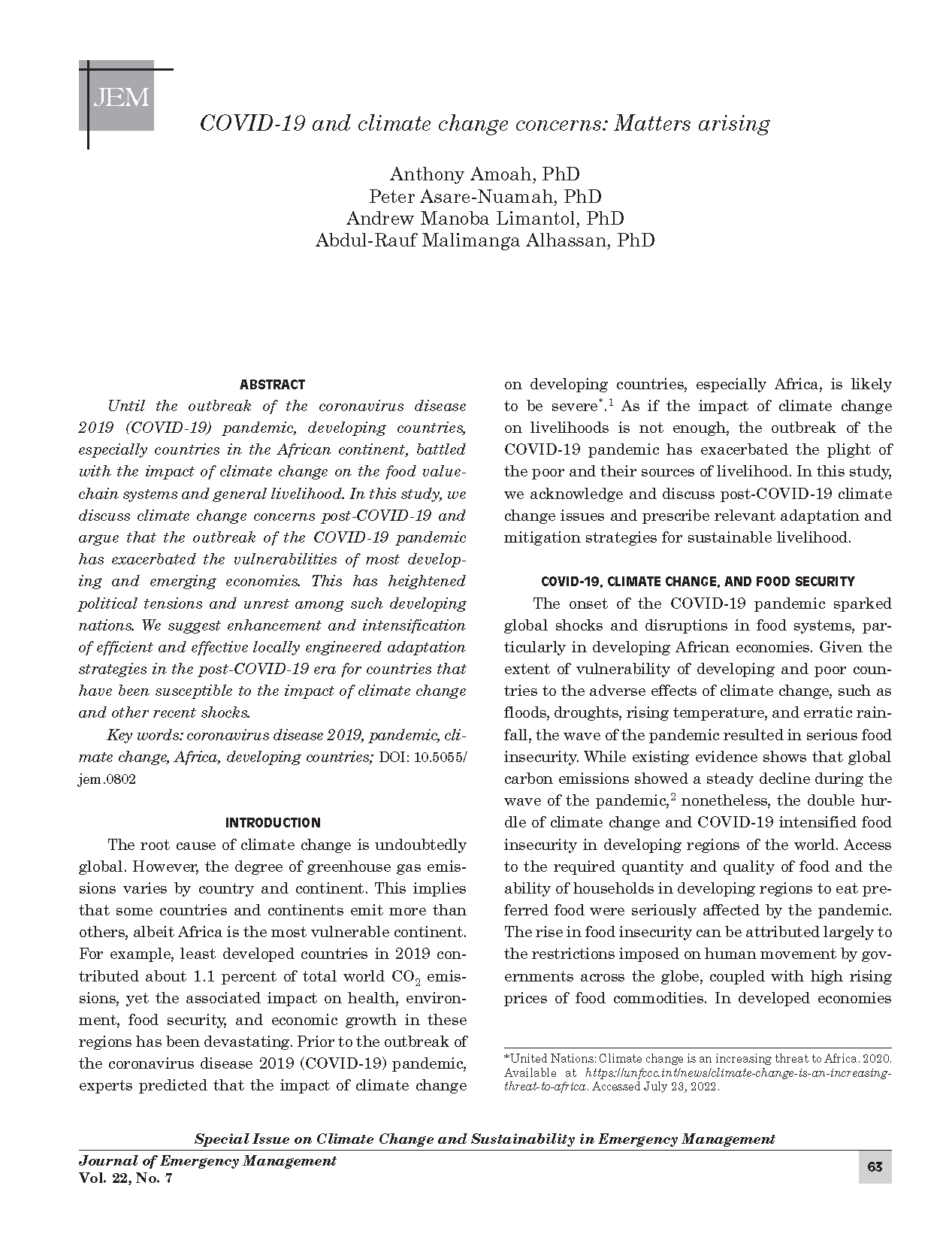COVID-19 and climate change concerns: Matters arising
DOI:
https://doi.org/10.5055/jem.0802Keywords:
coronavirus disease 2019, pandemic, climate change, Africa, developing countriesAbstract
Until the outbreak of the coronavirus disease 2019 (COVID-19) pandemic, developing countries, especially countries in the African continent, battled with the impact of climate change on the food value-chain systems and general livelihood. In this study, we discuss climate change concerns post-COVID-19 and argue that the outbreak of the COVID-19 pandemic has exacerbated the vulnerabilities of most developing and emerging economies. This has heightened political tensions and unrest among such developing nations. We suggest enhancement and intensification of efficient and effective locally engineered adaptation strategies in the post-COVID-19 era for countries that have been susceptible to the impact of climate change and other recent shocks.
References
Collier P, Conway G, Venables T: Climate change and Africa. Oxford Rev Econ Policy. 2008; 24(2): 337-353. DOI: https://doi.org/10.1093/oxrep/grn019
Tollefson J: COVID curbed 2020 carbon emissions—But not by much. Nature. 2021; 589: 343. DOI: 10.1038/d41586-021-00090-3. DOI: https://doi.org/10.1038/d41586-021-00090-3
Asare-Nuamah P, Onumah JA, Dick-Sagoe C, et al.: Perceptions and coping strategies to COVID-19 in a rural Ghanaian community. In Faghih N, Forouharfar A (eds.): Socioeconomic Dynamics of the COVID-19 Crisis: Global, Regional, and Local Perspectives. Berlin: Springer, 2022: 403-421. DOI: https://doi.org/10.1007/978-3-030-89996-7_18
Perlman S: Another decade, another coronavirus. N Engl J Med. 2020; 382: 760-762. DOI: 10.1056/NEJMe2001126. DOI: https://doi.org/10.1056/NEJMe2001126
Behnassi M, El Haiba M: Implications of the Russia–Ukraine war for global food security. Nat Hum Behav. 2022; 6: 754-755. DOI: 10.1038/s41562-022-01391-x. DOI: https://doi.org/10.1038/s41562-022-01391-x
Diop S, Asongu SA: The COVID-19 pandemic and the new poor in Africa: The straw that broke the camel’s back. Forum Soc Econ. 2023; 52: 143-154. DOI: 10.1080/07360932.2021.1884583. DOI: https://doi.org/10.1080/07360932.2021.1884583
Amuakwa-Mensah F, Klege RA, Adom PK, et al.: COVID-19 and handwashing: Implications for water use in Sub-Saharan Africa. Water Resour Econ. 2021; 36: 100189. DOI: https://doi.org/10.1016/j.wre.2021.100189
Pandey NN, Hübner C: Water security, pandemic and climate change incorporating public health into future water policy: Perspectives from South Asian countries. Regional Project Energy Security and Climate Change Asia-Pacific of the Konrad-Adenauer-Stiftung e.V. (KAS RECAP) and Consortium of South Asian Think Tanks (COSATT). 2020.
Amaechina E, Amoah A, Amuakwa-Mensah F, et al.: Policy note: Policy responses to ensure access to water and sanitation services during COVID-19: Snapshots from the environment for development (EfD) network. Water Econ Policy. 2020; 6(4): 2071002. DOI: https://doi.org/10.1142/S2382624X20710022
Suryadi B, Safrina R: The impact of COVID-19 on energy and climate change in ASEAN: ACE survey. ASEAN Climate Change and Energy Project (ACCEPT). 2020. Available at https://accept.aseanenergy.org/covid-19-on-energy-climate/. Accessed July 27, 2022.
Kikstra JS, Vinca A, Lovat F, et al.: Climate mitigation scenarios with persistent COVID-19-related energy demand changes. Nat Energy. 2021; 6(12): 1114-1123. DOI: https://doi.org/10.1038/s41560-021-00904-8
Vatta K, Bhogal S, Green AS, et al.: COVID-19 pandemic induced disruptions and implications for national food security and farm incomes: Farm-level evidence from Indian Punjab. Sustainability. 2022; 14(8): 4452. DOI: https://doi.org/10.3390/su14084452
Boughton D, Goeb J, Lambrecht I, et al.: Strengthening Smallholder Agriculture Is Essential to Defend Food and Nutrition Security and Rural Livelihoods in Myanmar against the COVID-19 Threat: Elements for a Proactive Response. Vol. 2. Washington, DC: The International Food Policy Research Institute, 2020: 1-11. DOI: https://doi.org/10.2499/p15738coll2.133687
Davies N, Sweeney S, Torres-Rueda S, et al.: The impact of coronavirus disease 2019 (COVID-19) on health systems and household resources in Africa and South Asia. MedRxiv. 2020. DOI: https://doi.org/10.1101/2020.05.06.20092734
Hopman J, Allegranzi B, Mehtar S: Managing COVID-19 in low- and middle-income countries. JAMA. 2020; 323(16): 1549-1550. DOI: 10.1001/jama.2020.4169. DOI: https://doi.org/10.1001/jama.2020.4169
Malpass D: COVID crisis is fueling food price rises for world’s poorest. World Bank Blog-Voices. 2021. Available at https://blogs.worldbank.org/voices/covid-crisis-fueling-foodprice-rises-worlds-poorest?cid=ECR_E_NewsletterWeekly_EN_EXT&deliveryName=DM92976. Accessed February 4, 2021.
World Bank: Confronting the economic and financial challenges of COVID-19: A conversation with world bank group president David Malpass. 2020. Available at https://www.worldbank.org/en/news/speech/2020/12/14/confronting-the-economic-and-financialchallenges-of-covid-19-a-conversation-with-world-bank-group-president-david-malpass. Accessed February 10, 2021.

Published
How to Cite
Issue
Section
License
Copyright 2007-2025, Weston Medical Publishing, LLC and Journal of Emergency Management. All Rights Reserved.
Leave Nobody Behind: Emergency Management in a More Inclusive Way is a trademark of Journal of Emergency Management





